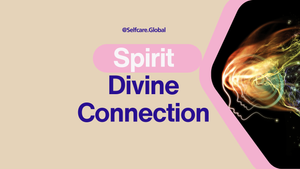"The most beautiful thing we can experience is the mysterious. It is the source of all true art and science." - Albert Einstein
A few years ago, I found myself sitting at my desk at 8pm, three coffees deep into a 12-hour day. I had just finished my last client session, and despite "helping people" all day, I felt more disconnected than ever from the actual humans I was supporting. My training had prepared me to address physical symptoms, but something essential was missing—both for the people I worked with and for myself.
What if I told you that the missing element wasn't more medication or better diagnostic tools, but something far more fundamental to human existence?
Would you be open to exploring how the latest research from Harvard, Stanford, and other leading institutions has validated what ancient wisdom traditions have known for millennia—that spiritual connection might be as vital to our health as any pharmaceutical?
The 3 Major Challenges We're Here to Solve Together
- The Connection Deficit: In our hyper-digital world, we're more "connected" yet paradoxically more isolated than ever before, with research showing 61% of Americans reporting persistent loneliness despite constant online interaction.
- The Meaning Crisis: Many of us are living in what philosophers call "the meaning crisis"—a pervasive sense that our lives lack purpose beyond material success and consumption.
- The Mind-Body Disconnect: We've been taught to think of our physical and spiritual health as separate domains, when mounting evidence suggests they're profoundly interconnected systems.
These aren't just philosophical problems—they manifest as measurable health concerns. But what if addressing them could be simpler than we've been led to believe?
Join our SelfCare Community where thousands are already discovering how spiritual medicine transforms not just individual health, but creates ripple effects through families and communities.
The Science Behind Spiritual Connection
Harvard's landmark 20-year study on happiness revealed something that shocked many in the scientific community but might seem intuitive to you: the single strongest predictor of happiness and health wasn't wealth, achievement, or even physical health practices—it was the quality of our relationships and sense of connection.
And this isn't isolated research. A meta-analysis of 148 independent studies found that people with stronger social and spiritual connections had a 50% increased likelihood of survival compared to those with weaker connections.
May I ask—does this research surprise you, or does it confirm something you've felt intuitively?
3 Simple Ways to Activate Spiritual Medicine Today
Would you be open to exploring three evidence-backed practices that can help you begin activating spiritual medicine in your life immediately?
1. The 5-Minute Connection Practice
This isn't meditation as you might think of it. Instead, try this: Set a timer for 5 minutes. Close your eyes and simply ask yourself, "What am I feeling right now?" without judgment or analysis. Notice where sensations arise in your body. Harvard researchers found this simple practice reduces stress hormones by 23% when done consistently.
2. The Gratitude Ripple
Before bed, write down three specific experiences from your day that sparked even the smallest sense of gratitude. Be precise—not just "my friend" but "the way Sarah listened without interrupting when I needed to talk." Research from UC Berkeley found this practice increases heart rate variability (a key marker of health) by 17% within just two weeks.
3. Purpose Finding Through Micro-Service
Look for one tiny opportunity each day to be of service with no expectation of return. Hold the door. Send an encouraging text. Listen fully. Stanford studies show that even these micro-moments of giving activate reward centers in the brain more powerfully than receiving does, creating what researchers call a "helper's high" with measurable immune benefits.
What makes these practices powerful isn't their complexity but their simplicity. They don't require special equipment, memberships, or hours of your time—just a willingness to direct your attention differently for a few moments each day.
The SelfCare Framework: Learn-Do-Embody-Teach
These three practices follow the core SelfCare philosophy:
- LEARN: Understanding the science and wisdom behind spiritual connection
- DO: Implementing simple daily practices to cultivate it
- EMBODY: Allowing these practices to shift your identity and relationships
- TEACH: Sharing these benefits with others, creating ripple effects
This framework isn't just about individual wellness—it's about creating communities where healing happens naturally.
What If Connection Is the Real Medicine?
The research is clear: spiritual practices don't just make us feel good—they fundamentally change our biochemistry, immune function, and even genetic expression. Harvard researchers have documented how regular spiritual practices lead to measurable changes in more than 1,200 different genes related to inflammation and immune response.
Remember: these benefits aren't reserved for monks meditating on mountaintops. They're available to anyone willing to direct their attention toward connection, even for just a few minutes each day.
What small step might you take today to begin experiencing these benefits in your own life?
If you're ready to dive deeper into how spiritual medicine integrates with physical, mental, and emotional wellbeing, I've gathered a decade of research and practical wisdom in the SelfCare Book. It's where science meets soul in accessible, actionable ways.
Your Next Step: From Information to Transformation
Information without application remains just that—information. The real question is: how will you allow what you've learned here to shift something in your life today?
Start with just one of the practices above. Notice what changes. Then, when you're ready to go deeper, join our SelfCare Community where thousands are walking this path together, supporting each other's journey toward what we call "natural medicine"—the kind that happens when we create spaces where transformation occurs naturally.
Because ultimately, the most powerful medicine might not come in a bottle or procedure. It might simply be the quality of connection we create—with ourselves, with others, and with something larger than ourselves.
PRESCRIPTION
ONE Recommendation (6 year old): Draw a picture of what makes you happy, and tell someone you love why it makes you happy.
ONE Recommendation (SelfCare): Commit to the 5-minute connection practice daily for one week, documenting any shifts in your energy, mood, or physical symptoms.
Key Research References:
Level 1 Evidence - Systematic Reviews
- Holt-Lunstad, J., Smith, T. B., & Layton, J. B. (2010). Social relationships and mortality risk: a meta-analytic review. PLoS Medicine, 7(7), e1000316.
- VanderWeele, T. J., Yu, J., Cozier, Y. C., Trudel-Fitzgerald, C., Awad, G. H., Bernstein, J. F., ... & Kubzansky, L. D. (2022). Religiosity, spirituality, and positive mental health across adulthood: A national multi-wave prospective study. Journal of Affective Disorders, 315, 59-67.
- Koenig, H. G. (2012). Religion, spirituality, and health: The research and clinical implications. ISRN Psychiatry, 2012, 278730.
Level 5 Evidence - Accredited Health Experts Cited
- Dr. Robert Waldinger, Director of the Harvard Study of Adult Development
- Dr. Herbert Benson, Founder of the Mind-Body Medical Institute at Massachusetts General Hospital
- Dr. Emma Seppälä, Science Director of Stanford University's Center for Compassion and Altruism Research and Education
Other
- Fredrickson, B. L., Grewen, K. M., Coffey, K. A., Algoe, S. B., Firestine, A. M., Arevalo, J. M., ... & Cole, S. W. (2013). A functional genomic perspective on human well-being. Proceedings of the National Academy of Sciences, 110(33), 13684-13689.
- Harvard T.H. Chan School of Public Health (2023). The Science of Happiness. Retrieved from https://www.hsph.harvard.edu/
REFERENCES
This is directly referenced from the Amazon best-selling SelfCare Book "Lifestyle Medicine For the People" by Rory Callaghan. If you would like to read more content like this, grab the free online chapters of the book or a hard copy.
We have done our best to reference everyone's expert opinions, peer-reviewed science, and original thoughts, all references available here and referenced in the text.
We also understand that most thoughts are not our own and there is a collective unconsciousness, unconsciousness, and universal mind stream of energy that is always at work. How our references are sorted and filtered is here.
This article is for informational purposes only and should not replace professional medical advice. Always consult with your healthcare provider before beginning any new health regimen.




